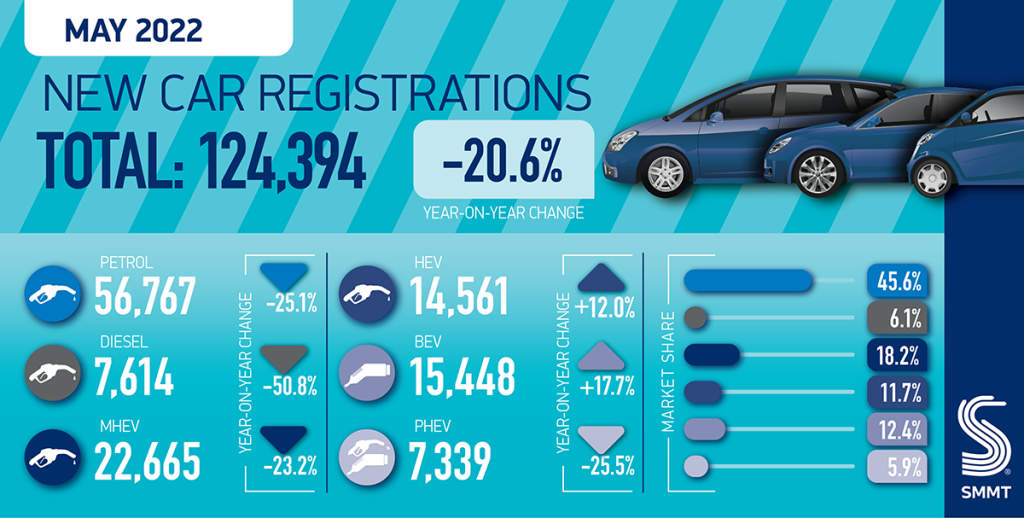New-car registrations in the UK fell 20.6% in May, as the country continues to struggle with vehicle supply due to component shortages as a result of manufacturing and political issues.
According to the latest registration figures from the Society of Motor Manufacturers and Traders (SMMT), 124,394 cars took to the roads in May, making it the second-weakest in three decades, after 2020 when dealerships were closed. The automotive industry is in the grips of supply-chain shortages, with the semiconductor crisis being added to by the war in Ukraine. This means carmakers are slowing production, and therefore supplies of new vehicles are coming to dealerships later, impacting registrations.
To highlight this, the SMMT points out that last month the market was down 32.3% compared to 2019, the last year before COVID-19 caused widespread disruption to the market.
Private customer purchases fell 10.3%, although market share for private vehicles increased year-on-year by 6.1 percentage points to 53.2%. As this market is where profits are made, the increased share suggests manufacturers are prioritising these sales over fleet purchases. This therefore affects this segment, which comprises of 46.8% of the market.

The supply chain challenge has contributed to an overall market decline in the year to date of 8.7%, equivalent to 62,724 fewer units. This is 40.6% below the five-year average recorded from January to May, as the new car market continues to struggle to emerge from the impact of the pandemic.
Battery-electric vehicle registrations rise
Another area carmakers are prioritising is the battery-electric vehicle (BEV) market. May UK registrations data shows this market increased by 17.7%, representing one in eight of every new car registered. Plug-in hybrids declined 25.5%, while hybrids were up 12%, meaning deliveries of electrified vehicles accounted for three in 10 new cars.
Although BEVs only make up a small percentage of the UK’s vehicle parc, as more people trade their vehicles in and look to sustainable options, in time the market share will increase. It is therefore essential for garages to prepare by seeking training in electric vehicles, with the upcoming UK Garage and Bodyshop Event at the NEC a perfect place to start researching.
Diesel continued its rapid decline in new-car sales, taking just 10.8% market share in May, leaving it in fourth behind petrol (59.1%), BEV (12.4%) and hybrid vehicles (11.7%).
“In yet another challenging month for the new car market, the industry continues to battle ongoing global parts shortages, with growing battery electric vehicle uptake one of the few bright spots,” said Mike Hawes, SMMT Chief Executive. “To continue this momentum and drive a robust mass market for these vehicles, we need to ensure every buyer has the confidence to go electric. This requires an acceleration in the rollout of accessible charging infrastructure to match the increasing number of plug-in vehicles, as well as incentives for the purchase of new, cleaner and greener cars.
“Delivering on Net Zero means renewing the vehicles on our roads at pace but, with rising inflation and a squeeze on household incomes, this will be increasingly difficult unless businesses and private buyers have the confidence and encouragement to do so.”




You must be logged in to post a comment.